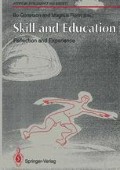Abstract
During the 1980s the concept of “tacit knowledge” became the central theme in discussions about professional skills and expertise in Sweden. This chapter discusses the reason for its popularity and investigates the most important underlying issues and controversies. Essentially, there seem to be two different knowledge traditions: a “scientific” one with the emphasis on articulated theories and descriptions, and a “practical” knowledge tradition with the emphasis on training and apprenticeship. It is argued that the expression “tacit knowledge” is misleading if it is taken as referring to a particular type of knowledge because, on the one hand, all knowledge is in a way tacit, and on the other, verbal expression plays an important role in all kinds of professional knowledge and expertise. In various attempts to explain the nature of “practical” knowledge, three strands can be distinguished, related to the view of knowledge as inherent in, respectively, a human body, a social community, and human actions. It is also argued that the main problem in trying to develop an explanation of “practical” knowledge is the tension between knowledge as an essentially critical enterprise, emphasized in science, on the one hand, and confidence in action, which is the hallmark of practical skills on the other. Finally, some outlines for a future epistemology of practical knowledge are proposed, suggesting that knowledge is never ending but always “moving”, and that people do not “have” but rather “participate in” knowledge.
Access this chapter
Tax calculation will be finalised at checkout
Purchases are for personal use only
Preview
Unable to display preview. Download preview PDF.
References
Quotations from Swedish sources in the text are translated by me unless otherwise stated in the notes.
Asplund, Johan (1987) Om hningscermonier, mikromakt och asocial pratsamhet. Korpen, Gothenburg.
Dreyfus, Hubert (1979) What computers can’t do. The limits of artificial intelligence, revised ed. Harper and Row, New York
Dreyfus, Hubert and Dreyfus, Stuart (1986) Mind over machine. The power of human intuition and expertise in the era of the computer., The Free Press, New York.
Dreyfus, Hubert (1988) The Socratic and Platonic basis of cognitivism. AI and Society 2 (2): 99–112.
Dreyfus. Hubert (1990) Is Socrates to blame for cognitivism? In: Gozon B,Florin M (eds), pp 219–228.
Grimen, Harald (1987) Aspects of act-identification and intention-identification. An essay on identificatory practices in human life. Vitskapsteoretisk Forum, The University of Bergen, Bergen.
Gozon, Bo (ed) (1983) Datautvecklingens filosofi.Tyst kunskap och ny teknik. Carlsson & Jon Bokfg, Stockholm.
Gozon, Bo (1990) Det praktiska intellektet. Datoranvning och yrkeskunnande. Carlssons, Stockholm (published in English, as The practical intellect, by UNESCO and Springer-Verlag, 1992)
Gozon, Bo and Josefson, Ingela (eds) (1988) Knowledge, skill and artificial intelligence. Springer-Verlag, London
Gozon, Bo and Florin, Magnus (eds) (1990) Artificial intelligence, culture and language: on education and work. Springer-Verlag, London
James, William (1978) Pragmatism and the meaning of truth Harvard University Press, Cambridge, MA.
Johannessen, Kjell S. (1988) Rule-following and tacit knowledge. AI and Society 2:287–302.
Johannessen, Kjell S. (1990) Rule-following and intransitive understanding. In: Goranzon B, Florin M (eds), pp 37–44
Kuhn, Thomas S. (1970) The Structure of scientific revolutions, 2nd edn. University of Chicago Press, Chicago.
Molander, Bengt (1989a) Acting with good reason. Knowledge and ignorance in human action., Studies of Higher Education and Research 1989:1
Molander, Bengt (1989b) What do you think you are doing? Reflections on justification and knowledge in action., In: Lindst, Rabinowicz W (eds) In so many words. Philosophical Essays dedicated to Sven Danielsson. Philosophical Studies, Uppsala pp 249–284.
Molander, Bengt (1990) Socratic dialogue. On dialogue and discussion in the formation of knowledge., In Gozon B, Florin M (eds), pp 229–243.
Nordenstam, Tore (1983) Ett pragmatiskt perspektiv pa dautvecklingen. In: Gozon B, pp 17–27.
Nor Caj (1987) Superdatorn lyfter glesbygden. Dagens Nyheter 28 December.
Peirce, Charles S. (1955) How to make our ideas clear. In: Buchler J (ed): Philosophical writings of Peirce. Dover, New York, pp 23–41. (originally published 1878.)
Plato Gorgias.Transl Lamb R M (Loeb Classical Library, 1983): transl Jowett B 3rd edn, in Plato, The Dialogues ( , 1924).
Polanyi, Michael (1978) Personal knowledge towards a post-critical philosophy. Routledge and Kegan Paul, London.
Polanyi, Michael (1966) The tacit dimension. Routledge and Kegan Paul, London.
Ryle, Gilbert (1949) The concept of mind, Hutchinson’s University Library, London.
Scho Donald A. (1983) The reflective practitioner. How professionals think in action. Basic Books, New York
Scho Donald A. (1987) Educating the reflective practitioner. Jossey-Bass, San Fransisco.
Taylor, Charles (1985) Interpretation and the sciences of man. In: Philosophy and the Human Sciences. Philosophical Papers 2., Cambridge University Press, Cambridge pp 15–57
Tempte, Thomas (1982) Arbetets Ara. Om hantverk, arbete, ndgra rekonstruerade verktyg och maskiner.The Center for Working Life, Stockholm
Wittgenstein, Ludwig (1961) Tictatus logico-philosophicus. Transl Pears DF and McGuiness BF., Routledge and Kegan Paul, London. (Originally published 1921)
Wittgenstein, Ludwig (1972) Philosophical investigations. Transl Anscombe GEM. Basil Blackwell, Oxford. (Originally published 1953)
Wittgenstein, Ludwig (1974) On certainty. Transl Paul D, Anscombe GEM. Basil Blackwell, Oxford.
Editor information
Editors and Affiliations
Rights and permissions
Copyright information
© 1992 Springer-Verlag London Limited
About this chapter
Cite this chapter
Molander, B. (1992). Tacit Knowledge and Silenced Knowledge: Fundamental Problems and Controversies. In: Göranzon, B., Florin, M. (eds) Skill and Education: Reflection and Experience. Artificial Intelligence and Society. Springer, London. https://doi.org/10.1007/978-1-4471-1983-8_2
Download citation
DOI: https://doi.org/10.1007/978-1-4471-1983-8_2
Publisher Name: Springer, London
Print ISBN: 978-3-540-19758-4
Online ISBN: 978-1-4471-1983-8
eBook Packages: Springer Book Archive

